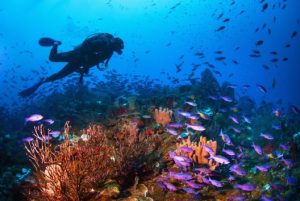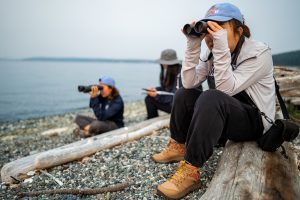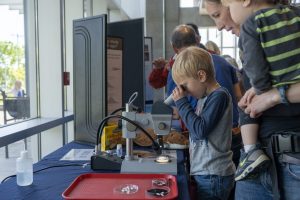Helping the kelp: effects of ocean warming on bull kelp forests

Dr Brooke Wiegel shares her postdoc research effort at Friday Harbor Labs with the Tide Bite newsletter. Many of you are familiar with the kelp forests that flourish throughout the Salish Sea and the outer coastal waters of Washington. These beautiful, giant brown algae are essential habitat-forming species – some grow from the bottom of the ocean to the surface, forming underwater forests that can extend more than 80 feet in height.
Read moreScientists Believe Evolution Could Save Coral Reefs, If We Let It

Coral reefs can adapt to climate change if given the chance to evolve, according to a study led by Coral Reef Alliance, Rutgers University, the University of Washington and other institutions.
The recent study, published in the journal Nature Ecology and Evolution, finds that coral reefs can evolve and adapt to the effects of climate change—but only if we protect a sufficient diversity of coral reefs, particularly when it comes to temperatures.
Spring Celebration 2022 honors 2021-22 UW Environment award winners

Congratulations to José Guzman, Mikelle Nuwer, and Aina Hori who were recognized by the UW College of the Environment for Exceptional Mentoring of Undergraduates, Outstanding Teaching Faculty, and Undergraduate Dean’s Medalist, respectively
Read moreThe Scientists Fighting for Parasite Conservation

Parasites play an outsize role in balancing ecosystems, and some species may be in danger. Read the article from Scientific American featuring SAFS’ Chelsea Wood who teaches Parasite Ecology (FISH 406) and Fisheries Ecology (FISH 312)
Read moreIntroducing GEODUC – An exciting new opportunity for incoming transfer students

Marine Geoscience Education, Oceanographic Discovery, Undergraduate Collaboration (GEODUC) is a new and unique offering from the UW College of the Environment. GEODUC is a two-week immersive experience for incoming transfer students on board our research vessel and at our marine field facilities. Students will receive hands-on training and create an independent research project to answer their own questions. All expenses are covered. In addition, students will receive a stipend of $1,400.
Read moreRewriting the Narrative: Student Spotlight with Chris Mantegna

Chris Mantegna is a first-generation, non-traditional student, who is currently finishing her Marine Biology undergraduate degree at the University of Washington. She also serves on the board of directors of Black Women in Ecology, Evolution, and Marine Science (BWEEMS) as co-chair of the Outreach, Mentorship, Social Committee. We recently caught up with Chris to learn more about her and how she became involved with this fast-growing international organization.
Read moreThousands of baby sea stars born at UW lab are sign of hope for endangered species

Scientists at the University of Washington, in collaboration with The Nature Conservancy, are raising sunflower sea stars in captivity, with the goal of learning more about this species and exploring eventual reintroduction to the wild, if determined to be advisable.
Read moreSEAS 2021 Open House

Explore our Watery World! Join the UW Marine Biology and School of Aquatic and Fishery Sciences communities for the SEAS 2021 Open House, May 19–22! This year’s free virtual Open House offers four days of family-friendly activities to safely celebrate science and research that relates to water.
Read more‘By-the-wind sailor’ jellies wash ashore in massive numbers after warmer winters

Thanks to 20 years of observations from thousands of citizen scientists, University of Washington researchers have discovered distinct patterns in the mass strandings of by-the-wind sailor jellies. Specifically, large strandings happened simultaneously from the northwest tip of Washington south to the Mendocino coast in California, and in years when winters were warmer than usual.
Read moreChelsea Wood featured on podcast “Science Rules! with Bill Nye”

When it comes to things that give us the heebie-jeebies, parasites reign supreme. However, they are a necessary part of our ecosystems. SAFS assistant professor Chelsea Wood joins Bill Nye on his “Science Rules!” podcast to explain what makes parasites so creepy, how to prevent them from killing us, and why she keeps digging around in decades-old cans of salmon.
Read more